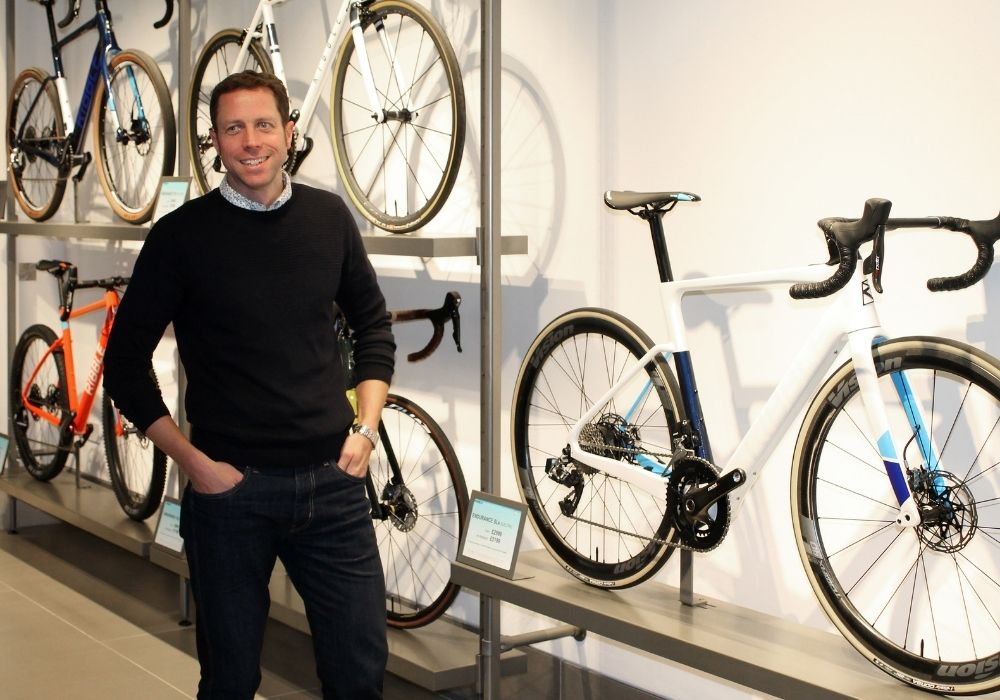Tell us a little about Ribble Cycles?
It was founded in 1897 as a manufacturer and retailer of premium cycles with a North West focus. I was a customer myself 30 years ago when buying my first proper race frame, I chose Ribble because the best riders in the UK at the time were riding Ribble. I customised and spec’d it up myself. Ribble were early adopters of mail order and direct-to-customer (DTC) retailing.
They also embraced digital taking their retail proposition online and unlike many other mail order companies of the time they have not faded away. As the DTC opportunity grew the strategic direction of the business moved away from the design and manufacture of their own brand complete bikes and over to selling Parts, Accessories and Clothing (PAC) from third party brands.
How did this play out?
When you sell products from third-party brands that are easily accessible with a relatively low barrier to market entry its no surprise that it gets very competitive. The third-party brands became the dominant part and with a product proposition that offered little differentiation, margins squeezed due to the competitive market we were trading in, it had become all about where we ranked on Google and were we the cheapest. It was not sustainable.
That’s when you received a call to join the company?
Yes. I got a call in 2017 when I was MD at Boardman Bikes from Ribble’s owner True. At the time the business was still focused on growing as a PAC retailer but the trading environment was changing quickly with competition intensifying rapidly. We had to fundamentally change what we were as a business.
Despite the challenges, there was still an underlying profitable premium bike brand that had been neglected. The brand could be great again. It could be the best premium British brand. It was about implementing a transformation strategy touching all parts of the business. We transitioned from a discounting PAC retailer to a product and digitally-focused premium DTC bike brand with some very compelling USPs including customisation and personalisation.
What else did you undertake?
There was, and continues to be, significant investment in R&D and infrastructure changes and we remain a digital-first business that is helping to boost the DTC and vertical integration at the core of the business. We also leveraged the advantage our business model gives us.
Ribble designs, sources, manufactures and retails DTC, thereby giving us more control over our supply chain and removing middlemen. This helps us deliver optimum value to our customers. There are no distributors, retailers and other brands adding in costs.
How has this digital-first approach impacted the business?
It has been a key component of delivering our product proposition and USPs, helping to drive strong growth pre-Covid-19. It has since accelerated with triple-digit growth in sales being experienced this past year. This growth hasn’t been without its challenges though, we have had a pandemic and Brexit to deal with and a global shortage and shipping delays of components has added further challenge and complexity. We have reacted to this by investing in our systems, customer journey and experience.
Personalisation is a big trend, how are you dealing with this?
An integral part of the Ribble experience is the ability for customers to customise and personalise their bikes and so enabling this digitally has been important. Every single bike is bespoke and built in the UK from the ground up by one mechanic.
This gives us the ability to offer a unique level of specification choice and customisation and then when you have spec’d your bike you can also choose from over four million different design and colour combinations.
You’ve also worked on the customer journey?
Building a rich experience around the customer is vitally important as buying a bike is a considered and important purchase. We have multiple ways of talking to our customers and we’ve wanted the personal experience to continue through Covid-19 with the help of technology.
The team can talk to remotely located customers about frame selection and detailed specifications via phone, live chat and particularly via a one way video link-up embedded into our website giving customers access to one of our experts in a ‘dark store’ environment using Go Instore, giving the in-store experience with our product range and advice remotely.
With the digital focus, do stores remain important?
Yes, and rather than being seen as traditional outlets they are designed as destination brand showrooms. They offer a broad experience that’s complimentary to and an extension of the digital customer journey, with our product available to see, touch and feel and a team of experts to help the customer through bike selection, options and sizing.
We have also bought the digital journey into the store with very large digital touchscreens with website access in all stores. We had a carefully selected new store roll-out planned for 2020 that had to be pushed back, but we are back on track now because we see physical retail as important. One new store model in particular that is launching very soon is going to be really exciting, not just within cycling but retail generally.
What are your plans for Ribble?
The brand and product proposition travels well particularly when combined with our digitally focused business model, so International business will become increasingly important for us. We are already seeing strong growth in the US, and Europe also looks interesting. We will continue to invest in our customer experience taking and acting on learnings from the past 12 months.
We’re always pushing forward with R&D and have a very exciting NPD launch plan including the e-bike category, which we see as an area of future growth. Parent company True has also invested in [cycle training app] Zwift, which we see as game-changing for many cyclists becoming a discipline in its own right with a significant benefit being applied to the real world as you can now ride Ribble bikes in the virtual world too.
This digital world of cycling is here to stay.









